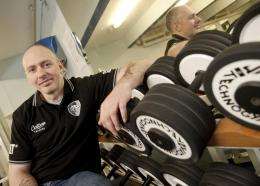The 'Adonis Complex' may excel gym users drive for muscularity

Student scientist Ross Thomson has been researching whether young male gym users are affected by what has been termed as the 'Adonis Complex'.
As part of his final project for his University of Derby BSc (Hons) Psychology and Counselling Studies degree course, Ross investigated whether there is a link between the pursuit of a lean muscular idealized body, the drive for muscularity and self esteem levels. In academic literature, academics Pope, Phillips and Olivardia (2000) identify male body image obsessions as the 'Adonis Complex'.
Ross embarked on research with 50 male gym users at LA Fitness in Derby who included weight and resistance training at least twice a week as part of their fitness regime. He also studied 50 male non-gym users from the wider Derby city area who had not taken part in regular exercise or sport for the last twelve months.
Study participants were invited to complete questionnaires gauging their scores against three tests: the Drive for Muscularity Scale, the Rosenberg self-esteem scale and the Muscle Dysmorphic Inventory (MDI).
Ross discovered that the results for the gym users were similar to those reported by bodybuilders and weightlifters in other studies, suggesting this group might be at risk of adopting potential harmful behaviors in the pursuit of muscularity.
They may also be susceptible to priming effects such as images which promote muscle development found in gyms, resulting in lower self-esteem. The study found that gym users possessed a higher drive for muscularity than non-gym users and suffered from increased feelings of being insufficiently muscular, or too small compared with non-gym users, as measured by the MDI.
Ross, 44, from Allestree Lane, Derby, suggests that fitness instructors should have a greater awareness of these issues when assessing the training regimes used by individual gym users. He also suggests better signposting at gyms for support outlets.
Ross said: "While most men who exercise in gyms do so responsibly and are realistic about their physique, there appears to be a male body image continuum with those possessing excessive drive for muscularity levels being more susceptible to body dysmorphia.
"This particular group of men may also be at risk of adopting potential harmful behaviors such as eating disorders and steroid use in the pursuit of muscularity.
"While these concerns seem to be well known in bodybuilding and specialized gyms it is currently unclear how widespread this problem is in more mainstream fitness centres."
Ross says Derby was one of the few universities to offer Psychology and Counselling Studies as a subject choice and he would now like to pursue a PhD if he can secure a student scholarship. Previously he worked as a team leader for Toyota and volunteered out in Africa.
Ross will be awarded the McGraw-Hill Prize for his outstanding independent study alongside his First Class degree at the University's annual Awards Ceremonies on Saturday,22 January, Ross is also due to present his research at the Midlands Health Psychology Conference in February.
His tutor at Derby, Senior Lecturer in Health Psychology Dr. Vicki Staples, said: "Ross's findings highlight the potential need for additional monitoring and safeguarding measures within mainstream gyms to protect men who may be at risk. Ross has been an exemplary student throughout his studies and fully deserves the First Class Honors degree he achieved."















